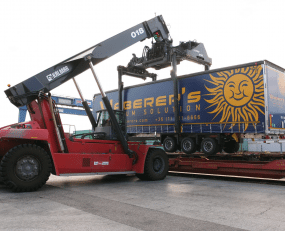
Waberer’s revenue increased by 7.9% in Q3 2021 on a year-on-year basis, reaching €147.8m. The change compared to the previous quarter (Q2 2021) was -1.4% and both the ITS and RCL segments were affected. The quarter-by-quarter change was mostly driven by seasonal patterns, including summer holidays and seasonal production decrease at major factories during the holiday season.
Recurring EBIT reached €6.6m in Q3 2021 which is a €5.4m improvement compared to Q3 2020, while year-to-date recurring EBIT increased by €20.3m compared to the first nine months of 2020 and reached €18.9m. The quarterly EBIT increase is mostly attributable to the ITS segment (+6.7m year-on-year increase). The ITS segment further improved compared to the previous quarter and achieved the second consecutive quarter with positive EBIT performance. Quarterly recurring EBIT decreased by €1.2m in the RCL segment in Q3 2021 mostly due to return of the normal pre-covid expense level. There was no change in the recurring EBIT in the Other segment compared to Q3 2020.
Recurring Net income increased to €3.3m in Q3 2021 which is a €4.5m improvement on a year-on-year basis while year-to-date cumulative recurring Net Income reached €12.1m in 2021, a €27m improvement compared to the first nine months of 2020.
ITS (International Transportation Segment) revenue increased by 13.8% in Q3 2021 compared to the same period in 2020. The average active fleet size was 1999, a slight (20-50) decrease compared to the previous quarters. Despite the slight fleet size decrease, the revenue increased significantly as a result of the new segment strategy launched in the middle of the previous year as the current strategy focuses on customers with higher quality requirements and services with more added value. The first nine months revenue exceeded the equivalent period last year by 2.2 % in the ITS segment. Recurring gross profit in Q3 2021 increased by 46.9% to €17.5m due to the improving efficiency of the fleet and the gross profit margin increased by 4.5% points to 20.2% compared to last year. Recurring EBIT in Q3 2021 reached its highest level since 2017 and was €1.4m, an improvement of €6.7m compared to the same period last year. The segment’s EBIT margin improved by 8.6 % points compared to the third quarter of 2020. The continuously improving EBIT performance demonstrates the success of the Trade Lane model introduced in the summer of 2020 and is the result of more favourable pricing achieved by the services focusing on unique customer needs and higher service quality, while the annual mileage per vehicle also increased slightly.
Revenue in the RCL (Regional Contract Logistics) segment was €44.7m in Q3 2021 and remained unchanged compared to the third quarter of 2020. The cumulative revenue in the segment in 2021 was €135m, an improvement of 5.8% compared to the first nine months of 2020. Gross margin decreased by 18.7% to €11.2m in the third quarter, reaching a gross margin level of 25.2%. Recurring EBIT in Q3 2021 was €3.0m, a year-on-year decrease of €1.2m and the EBIT margin level was 6.7%, while the recurring EBIT for the first three quarters was €10.6m, an increase of €1.9m. The decrease of the EBIT in the third quarter was due to the return to normal subcontractor fees after the pandemic and the increasing personal-related costs to the pre-pandemic level, and the unpredictable change of the production volume of automotive customers.
Based on the proven results, the company is putting further efforts into increasing the proportion of customers who demand special services such as guaranteed capacity, transportation of special (ADR) goods, environmental friendly transportation, tracking of high value goods during all stages of the transportation, etc.
Zsolt Barna, CEO of Waberer’s commented: “I am very pleased to inform you that we have managed to stabilize the Group level profitability and as a result of the further improvement of the ITS segment – which provided several challenges in the previous year, the cumulative first 9 month segment EBIT also turned positive, so the positive results of the historically successful RCL and Other segments are even more visible also on the Group level results.”
The number and the volume of the risks affecting the logistics industry is increasing, such as the chip and other components shortage that affects more and more customers, the unpredictable changes of the global supply chain processes, the increasing pressure of labour force shortages, and the temporary shortage of Adblue, an indispensable component of the modern EURO6 diesel engines providing significantly lower emission levels during operation. However, the company believes that its well-diversified customer portfolio (both geographically and on an industry basis), its purchasing power and access to an international driver pool can significantly decrease the effect of these risks.
Source: Waberer’s